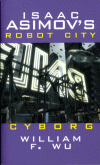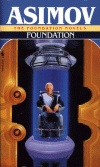This review will most likely contain spoilers for any previous books in the series, read at your own risk.
This book has a nice intro from Asimov talking about cyborgs that is quite interesting. I always like reading these. Derec and Katherine have proven they didn’t commit murder, and stopped the rapid expansion of the city. They still stuck in Robot City though and are still searching for a way out. They are sidetracked by a rogue cyborg that escaped from a medical facility. I like the repercussions that are explored by transplanting a human brain into a robot body. The book goes by really quickly with lots of action and a few tidbits of information to keep the main plotlines going also.


I enjoyed the first two books in the series. The problem with this book was the constant repetition of the laws of robotics. I also was annoyed at the humans’ constant manipulation of the laws to get the robots to do what they wanted them to do. Robots never need to be reminded of the laws, they are programmed to follow them. Robots must do what they are told unless it interferes with the first law, so why the manipulation? I think the author needed to state the laws maybe one time and then the humans could have created the situations where the robots would have to follow the laws without the constant reminding.
I did enjoy the plot line about the cyborg and the mental effects of becoming a combination of man and robot. I am hoping that the writing in the rest of the series goes back to the quality of the first two books.
From what I remember, some of the books in this series are better than others. Since they are all done by different authors, the next one might be better. I think that Prodigy was one of my favorites of the six. Unfortunately, this same author (of Cyborg) is the author of the last book as well.